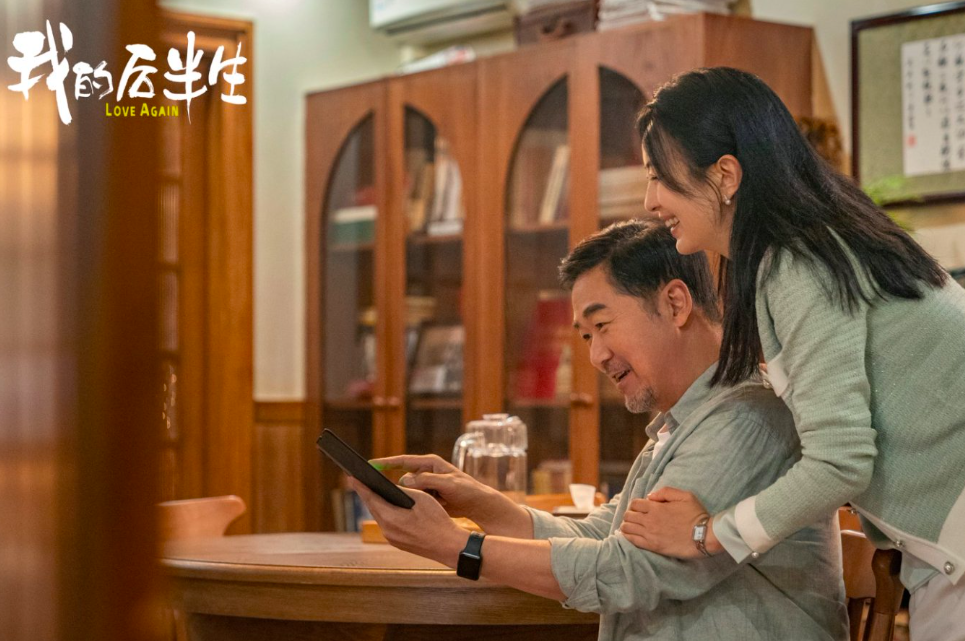
my country's population aged 60 and above has now exceeded 300 million. The living conditions and emotional needs of the elderly have become a social issue that cannot be ignored. Recently, a TV series focusing on the emotional world of the elderly, "My Second Half of Life", was broadcast. In addition to focusing on elderly marriage and love, it also touched on social topics such as family relationships, funeral concepts, etc.
From novels to movies and TV series
"The Second Half of My Life" is adapted from Wang Meng's novel "Strange and Sad Everywhere". In the play, Zhang Guoli plays Shen Zhuoran, a retired professor of literature with two children and three generations living under the same roof. After his wife passed away, he embarked on a blind date journey with the encouragement of an old friend.

Stills from "My Second Half of Life"
"Strange and Strange, Sad Everywhere" was published ten years ago. Wang Meng called this a work in which "tears will lead to joy".
The original work writes about six women, namely Na Weitian, the teacher whom the protagonist had a crush on when he was young, his first wife Shuzhen, and four other women Lian Yilian, Nie Juanjuan, Lu Yuan and Le Shuishan who appeared in his life after Shuzhen's death. They have different faces. For example, Lian Yilian plays multiple roles including chef, health worker, nurse, etc., but she parted ways with Shen Zhuoran because of the property issue; the intellectual woman Nie Juanjuan got along very well with Shen Zhuoran, but she only ate three wontons in the first meal they had together, and said, "I almost died of fullness after eating it"...
In a previous interview, Wang Meng said: "The female characters in the new work have many 'odd' things, but their 'odd' is caused by difficulties, oppression, misfortune or the difference in character in life... The Chinese have a saying that eight out of ten things in life are not satisfactory. I think the sadness here refers to the difficulties and misfortunes in life, but I also think that no matter what difficulties they encounter, they are cheering up and fighting for their old age. I didn't write it in a tragic way, on the contrary, you find it very interesting. I think this is the beautiful dream in sadness, and sadness in beautiful dreams. From a literary perspective, I have defined humor as: happiness after tears are gone."
On April 22, a seminar on "The Second Half of My Life" was held in Beijing. Wang Meng, who is over 90 years old, shared his "impressions after watching" through a video speech: "My original work "Strange Flowers, Strange Flowers, Sad Flowers" is like its source, a tree root. The TV series has greatly developed and supplemented the original work, becoming a tree full of flowers. Of course, TV series and literature are not trains on exactly the same track, and they each have their own characteristics. The TV series "The Second Half of My Life" has made great progress in humanity, fireworks, drama, fun, sociality, debate, enthusiasm, and tension. This is a very happy thing. Of course, it has also opened up a considerable distance from the original work. I think they can go their own way, not interfere with each other, and complement each other."

Stills from "My Second Half of Life"
Lan Xiaoxi, the screenwriter of "The Second Half of My Life", said that the original novel is based on the love story of retired professor Shen Zhuoran, peeling off layer by layer to question the value of life. "We need to do addition and subtraction on this basis, think clearly about the past and present lives of each character, make clear the motivations for their behaviors, interweave the relationships between the characters, and even think clearly about everyone's little thoughts."
"On the first day of making the play, we reached a consensus that birth, aging, sickness and death are inevitable, and we wondered if we could find a more open-minded and relaxed way to express it. Through a lot of observation and accumulation, we gradually created the enthusiastic and down-to-earth Sun Baoqin, the pitiful Lian Feilian, the otherworldly Nie Juanjuan, the seemingly chic but scarred Le Shuishan, and the ever-growing Shen Zhuoran." Lan Xiaoxi said.
Old age is not the end of life
At the seminar, the actresses who played the female characters in the play also shared their experiences.
Xu Di, who plays "Sun Baoqin", said that she was initially worried about whether elderly themes could be paid attention to in the current environment. With the focus on the stories of young people, is there still expression belonging to our generation?
Xu Di plays Sun Baoqin, the protagonist's relative-in-law, an ordinary mother who is retired at home. "She was born in the market, has a straightforward personality, speaks without embellishment, and has the image of the mothers-in-law and mothers we are familiar with. She is enthusiastic, nagging, a little noisy, and does things in a hurry, even a little without boundaries. But this unconcealed expression constitutes her unique breath of life and life. Sun Baoqin has not experienced major emotional ups and downs. She is always simple and enthusiastic, and sometimes even a little harmless. "

Stills from "My Second Half of Life"
Talking about playing this role, Xu Di said: "This creation is also a multi-dimensional exploration. I especially cherish those seemingly insignificant details in the performance. For example, Sun Baoqin chose to kneel at Lao Gou's funeral. This kneeling was her epiphany and reflection. She felt that her judgment of people and things might not be accurate. For example, Sun Baoqin held Nie Juanjuan's feet in her arms in the car, which was also designed by me after much thought. Because the script gave me to cover my feet with a scarf, I felt that I should directly use the warmth of body language to convey the warmth of emotions and reflect the warm mutual help between women."

Xu Di
Regarding the content of "My Second Half of Life", Xu Di said: "It focuses on the increasingly prominent issue of gray hair in today's society. We also hope to make more people realize that old age is not the end of life, but the beginning of the second half of life, and there is another possibility of restarting vitality."
She shared the story behind the creation: "'Strange Things Everywhere' is based on Wang Meng's personal experience after his wife passed away. There is a certain degree of fiction in the creation of the novel, but I feel that two of them must have really happened because the novel describes them in great detail. I also read a book called 'A Brief History of Ukrainian Tractors', which tells the story of a father finding a 30-year-old Ukrainian hottie to fall in love with after his mother passed away. My perspective was opened up. I think we don't have to find a story about an old man and four girlfriends. We can add the story of his children and grandchildren to make it a complete family drama."


